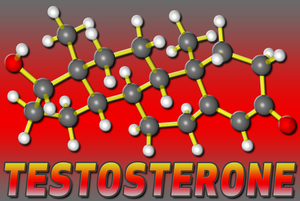The hormone testosterone is responsible for numerous sex characteristics in men including the growth and development of the sex and reproductive organs. In addition to assisting with fat distribution, bone mass and deepening of the voice, testosterone also helps keep up energy levels, sex drive and fertility. As men age, their production of testosterone naturally begins to decline. However, some men may develop a testosterone deficiency during their life. This disorder is known as hypogonadism.
What Is It? Hypogonadism is one of the main causes of male infertility. It is estimated that 13 million men in the United States alone are affected by hypogonadism, yet less than 10% of these men actually seek treatment for the disorder. Hypogonadism occurs when there is disease or damage to the pituitary gland, testicles or hypothalamus. Any problems in these areas can lead to a deficient production of the gonadotropin hormone.
Testosterone deficiency can occur at any stage of a mans life. Some males are born with the deficiency, making it a congenital abnormality, while others develop the disorder before the onset of puberty. Others still develop it later in life, during adulthood.
Due to the lack of testosterone, men affected by hypogonadism often have troubles producing sperm. The low levels of testosterone also result in an adult male having a low sex drive and erectile dysfunctions. All of these factors combine to make it difficult for a man to father a child.
What Causes Hypogonadism? There are two types of male hypogonadism: primary and secondary. Primary hypogonadism refers to a testosterone deficiency that stems from abnormal testicular function. Secondary hypogonadism is the result of problems with the pituitary gland or the hypothalamus, which controls the secretion of pituitary hormones. When messages from either of these sources become impaired, normal performance of the testicles is compromised.
There are numerous causes for primary hypogonadism such as undescended testicles, excess iron in the blood (known as hemochromatosis), an injury that causes damage to the testicles, mumps, and chemotherapy or radiation treatment. Klinefelters syndrome, which results in a male being born with an extra x chromosome, can lead to impaired testicular growth as well as problems in sperm production and is another cause of primary hypogonadism.
Secondary hypogonadism can be the result of pituitary disorders and inflammatory diseases that affect the pituitary gland. Also, Kallmans syndrome, which affects the proper development of the hypothalamus, ultimately leads to a testosterone deficiency. Additionally, certain medications, like those used to help heartburn or control moods, can affect the level of testosterone produced by the body.
Signs And Symptoms The effects of hypogonadism vary depending on when a man develops the disorder. In cases where hypogonadism is congenital, the gonads fail to produce enough testosterone for proper development of the external genitals and internal reproductive organs. This results in a child whose sex is ambiguous at birth.
When testosterone deficiency becomes present at the start of puberty, normal growth and development is impaired. Muscle mass does not increase as much and the male voice remains high. There is often a lack of facial body hair growth while the penis and testicles fail to mature. The arms and legs may grow to be out of proportion with trunk of the body. There may even be some development of breasts.
The onset of hypogonadism in adulthood can significantly change the physical appearance of men as well as hinder the normal reproductive functions and cause emotional changes that mirror the experience of menopausal women. Signs of hypogonadism in adult males include:
Getting Help If you display any of the symptoms of hypogonadism, make an appointment with your family physician. A blood test that measures testosterone levels can reveal whether or not there is a deficiency. Proper evaluation by an endocrinologist (a doctor that specializes in hormones) will be necessary, though, for a definitive diagnosis. Ask for a referral to an endocrinologist if your family physician does not automatically provide one.
There are different types of treatments available to help those with a testosterone deficiency. If you have primary hypogonadism, the most likely method of treatment will be testosterone replacement therapy (TRT). This will aid in increasing the production of testosterone. However, it may not help you recover your fertility. It may be necessary for you and your partner to employ assisted reproductive technology methods in order to conceive. Those men affected by secondary hypogonadism have a better chance of recovering their fertility through the use of TRT.
There are numerous ways in which TRT can be administered. The most popular method is a patch that can be worn on the scrotum or elsewhere on the body that will allow the body to receive a continuous supply of hormones. Aside from the patch, there are intramuscular injections that are given every two weeks, which men can do at home. A testosterone gel for hypogonadism is also available as is a mucoadhesive that dissolves into a more gel-like substance when you place it on your gum line. This allows the testosterone to be absorbed directly into the blood stream. There are also oral testosterone supplements available but these are rarely used nowadays due to the associated side effects.
Psychological counseling for both yourself and your partner is also a good idea to help you mutually deal with the emotional aspects of the problem. Additionally, you may want to seek a support group in your area where you can talk with other people who are also affected by the disorder.
Here is the original post:
Hypogonadism Causes Infertility. Learn how to detect and ...
Contact Us Today For A Free Consultation

- BioSante Pharmaceuticals, Inc. to Present at BIO Investor Forum [Last Updated On: October 24th, 2015] [Originally Added On: October 9th, 2012]
- Secondary osteoporosis: More than what meets the eye! [Last Updated On: January 15th, 2018] [Originally Added On: October 10th, 2012]
- Trimel Provides Clinical and Operational Update [Last Updated On: December 2nd, 2017] [Originally Added On: October 15th, 2012]
- Obese teen boys likelier to become impotent and infertile adults [Last Updated On: December 11th, 2017] [Originally Added On: October 17th, 2012]
- Obese teen boys have up to 50 percent less testosterone than lean boys [Last Updated On: December 27th, 2017] [Originally Added On: October 17th, 2012]
- Trimel Reports Physician Market Research Results for CompleoTRT(TM) [Last Updated On: January 8th, 2018] [Originally Added On: October 24th, 2012]
- Obese teen boys likelier to turn into 'impotent' men [Last Updated On: January 19th, 2018] [Originally Added On: October 24th, 2012]
- Trimel Pharmaceuticals Corporation to Report Third Quarter 2012 Results and Host a Conference Call to Update Investors [Last Updated On: January 2nd, 2018] [Originally Added On: November 2nd, 2012]
- Peer Exchange: Establishing Bone Health Clinics - Video [Last Updated On: January 10th, 2025] [Originally Added On: November 2nd, 2012]
- What is hypogonadism and how does it affect fertility? - Video [Last Updated On: January 10th, 2025] [Originally Added On: November 2nd, 2012]
- Low Testosterone in Men or Man-O-Pause - Video [Last Updated On: January 11th, 2025] [Originally Added On: November 2nd, 2012]
- Propecia (Finasteride) -- Undisclosed Mechanisms, Potential Dangers [Last Updated On: January 11th, 2025] [Originally Added On: November 2nd, 2012]
- How to Get Ripped - Why You Shouldnt Use Anabolic Steroids - Video [Last Updated On: January 12th, 2025] [Originally Added On: November 2nd, 2012]
- Future Doc: Andropause Alternatives with Dr. James Biddle Part 1 - Video [Last Updated On: January 12th, 2025] [Originally Added On: November 2nd, 2012]
- Sector Update: Healthcare - Video [Last Updated On: January 13th, 2025] [Originally Added On: November 2nd, 2012]
- Increase Testosterone Naturally With these Diet And Workout Secrets - Video [Last Updated On: January 13th, 2025] [Originally Added On: November 2nd, 2012]
- Signs And Symptoms of Hypogonadism [Last Updated On: December 29th, 2016] [Originally Added On: November 2nd, 2012]
- Auxilium and Pfizer Will Conclude Agreement on XIAPEX® EU Collaboration [Last Updated On: May 4th, 2015] [Originally Added On: November 9th, 2012]
- Repros Therapeutics Inc.(R) Reports Third Quarter 2012 Financial Results [Last Updated On: May 4th, 2015] [Originally Added On: November 14th, 2012]
- hypogonadotropic hypogonadism - Video [Last Updated On: February 5th, 2025] [Originally Added On: November 22nd, 2012]
- Research and Markets: Male Hypogonadism - Pipeline Review, H2 2012 [Last Updated On: December 7th, 2017] [Originally Added On: November 30th, 2012]
- Auxilium Pharmaceuticals, Inc. to Present At The Oppenheimer 23rd Annual Growth Conference [Last Updated On: May 4th, 2015] [Originally Added On: December 8th, 2012]
- Low Testosterone (Hypogonadism) - Part 2 - Video [Last Updated On: December 10th, 2012] [Originally Added On: December 10th, 2012]
- The National Mesothelioma Law Firm of Baron and Budd Reports on a New Drug that Could Improve the Health of ... [Last Updated On: May 4th, 2015] [Originally Added On: December 19th, 2012]
- Hypogonadism ¦ Treatment and Symptoms - Video [Last Updated On: March 7th, 2013] [Originally Added On: March 7th, 2013]
- Research and Markets: Male Hypogonadism Global Clinical Trials Review, H1, 2013 [Last Updated On: December 28th, 2017] [Originally Added On: May 1st, 2013]
- Male hypogonadism Prof Ossama Fouda - Video [Last Updated On: May 9th, 2013] [Originally Added On: May 9th, 2013]
- Hypogonadism - what should you do - Video [Last Updated On: July 2nd, 2013] [Originally Added On: July 2nd, 2013]
- Low Testosterone (Hypogonadism) - Part 3 - Video [Last Updated On: July 2nd, 2013] [Originally Added On: July 2nd, 2013]
- NURS805 Hypogonadism Lecture - Video [Last Updated On: August 16th, 2013] [Originally Added On: August 16th, 2013]
- Hypogonadism: MedlinePlus Medical Encyclopedia [Last Updated On: December 17th, 2017] [Originally Added On: November 3rd, 2013]
- Hypogonadism - Diseases & Conditions - Medscape Reference [Last Updated On: December 27th, 2017] [Originally Added On: November 10th, 2013]
- Hypogonadotropic hypogonadism - Wikipedia, the free encyclopedia [Last Updated On: January 24th, 2018] [Originally Added On: November 10th, 2013]
- Low Testosterone (Low-T) Normal Levels, Hypogonadism, Symptoms ... [Last Updated On: January 1st, 2018] [Originally Added On: November 15th, 2013]
- HYPOGONADISM - University of Dundee [Last Updated On: May 4th, 2015] [Originally Added On: November 23rd, 2013]
- FAQ - Hypogonadism - MEDICAL DIAGNOSIS AND MEDICINAL PLANTS [Last Updated On: January 27th, 2018] [Originally Added On: November 23rd, 2013]
- Hypogonadism - About.com Men's Health [Last Updated On: December 12th, 2017] [Originally Added On: December 2nd, 2013]
- Exciting medical advances using HRT [Last Updated On: May 4th, 2015] [Originally Added On: December 12th, 2013]
- Male hypogonadism: Symptoms - MayoClinic.com [Last Updated On: March 28th, 2020] [Originally Added On: December 12th, 2013]
- Audio-Digest Foundation Announces the Release of Oncology Volume 04, Issue 16: Highlights from Future Directions ... [Last Updated On: December 15th, 2013] [Originally Added On: December 15th, 2013]
- Hypogonadism - Medscape Reference [Last Updated On: January 29th, 2018] [Originally Added On: December 21st, 2013]
- Hypogonadism [Last Updated On: January 12th, 2018] [Originally Added On: December 23rd, 2013]
- Hypogonadism - HealthCentral [Last Updated On: December 14th, 2017] [Originally Added On: December 24th, 2013]
- Hypogonadism | Medscape - Latest Medical News, Clinical Trials ... [Last Updated On: December 18th, 2017] [Originally Added On: December 30th, 2013]
- Hypogonadism - SharedJourney [Last Updated On: December 19th, 2017] [Originally Added On: January 23rd, 2014]
- Study Finds Potential Heart Risks from Testosterone Therapy [Last Updated On: November 24th, 2020] [Originally Added On: February 3rd, 2014]
- Endocrine Society calls for large-scale studies to evaluate testosterone therapy risks [Last Updated On: November 18th, 2020] [Originally Added On: February 8th, 2014]
- Testosterone Therapy Not Always Good for Older Men [Last Updated On: October 3rd, 2020] [Originally Added On: February 11th, 2014]
- Hypogonadism: Types, Causes, & Symptoms Healthline [Last Updated On: December 5th, 2017] [Originally Added On: February 14th, 2014]
- Low Testosterone (Hypogonadism) in Men - Video [Last Updated On: November 7th, 2020] [Originally Added On: February 14th, 2014]
- Hypogonadism : Types, Causes, & Symptoms - Healthline [Last Updated On: January 28th, 2018] [Originally Added On: February 17th, 2014]
- Hypogonadism | Medscape - Latest Medical News, Clinical ... [Last Updated On: October 6th, 2020] [Originally Added On: February 23rd, 2014]
- Endo: FDA Oks AVEED Injection For Treatment Of Adult Men With Hypogonadism [Last Updated On: November 3rd, 2020] [Originally Added On: March 6th, 2014]
- Unit Project 1 Hypogonadotropic hypogonadism - Video [Last Updated On: November 26th, 2020] [Originally Added On: March 8th, 2014]
- Update on Endo's Product Portfolio - Analyst Blog [Last Updated On: October 17th, 2020] [Originally Added On: March 11th, 2014]
- Male hypogonadism Symptoms - Diseases and Conditions ... [Last Updated On: October 20th, 2020] [Originally Added On: April 2nd, 2014]
- Hypogonadism: Types, Causes, & Symptoms - Medical ... [Last Updated On: November 11th, 2020] [Originally Added On: April 6th, 2014]
- VLog #127 Frances Explains Hypogonadism. - Video [Last Updated On: November 4th, 2020] [Originally Added On: April 7th, 2014]
- Repros Completes Enrollment for Androxal Study - Analyst Blog [Last Updated On: October 27th, 2020] [Originally Added On: April 16th, 2014]
- Prevalence, Diagnosis and Treatment of Hypogonadism in ... [Last Updated On: April 30th, 2014] [Originally Added On: April 30th, 2014]
- Repros Therapeutics Q2 Loss a Penny Wider than Expected - Analyst Blog [Last Updated On: October 3rd, 2020] [Originally Added On: August 12th, 2014]
- Repros Reports Encouraging Late-Stage Data on Androxal - Analyst Blog [Last Updated On: October 5th, 2020] [Originally Added On: August 28th, 2014]
- Repros Therapeutics Analyst Brief Report; Androxal(R) Achieves Superiority in Top Line Analysis by Small Cap Street ... [Last Updated On: October 31st, 2020] [Originally Added On: September 30th, 2014]
- The Wall Street Journal: Repros Therapeutics shares drop on drug application setback [Last Updated On: October 22nd, 2020] [Originally Added On: October 18th, 2014]
- Apricus expands development pipeline with in-licensing of US rights for fispemifene [Last Updated On: November 21st, 2020] [Originally Added On: October 21st, 2014]
- Apricus expands development pipeline with the in-licensing of US rights for fispemifene, a phase 2b ready asset, from ... [Last Updated On: November 20th, 2020] [Originally Added On: October 21st, 2014]
- Hypogonadism No Moustache! No Beard!! [Last Updated On: November 20th, 2020] [Originally Added On: October 28th, 2014]
- Male Hypogonadism: Male Reproductive Endocrinology: Merck ... [Last Updated On: December 24th, 2017] [Originally Added On: October 28th, 2014]
- Hypogonadism Wikipedia [Last Updated On: November 10th, 2020] [Originally Added On: October 28th, 2014]
- Urology Care Foundation - Urology A-Z - Low Testosterone [Last Updated On: June 19th, 2015] [Originally Added On: November 3rd, 2014]
- Will Repros (RPRX) Miss Estimates This Earnings Season? - Analyst Blog [Last Updated On: October 11th, 2020] [Originally Added On: November 5th, 2014]
- Hypogonadism in men living with HIV - Video [Last Updated On: November 22nd, 2020] [Originally Added On: November 7th, 2014]
- Male Hypogonadism Therapeutic Pipeline Industry Review, H2 2014 - Video [Last Updated On: November 14th, 2020] [Originally Added On: November 7th, 2014]
- Testosterone Deficiency (Hypogonadism) Overview ... [Last Updated On: November 23rd, 2014] [Originally Added On: November 23rd, 2014]
- Endo to Acquire Rights to Testosterone Nasal Gel Natesto - Analyst Blog [Last Updated On: November 12th, 2020] [Originally Added On: November 26th, 2014]
- Male hypogonadism pathophysiology - Video [Last Updated On: October 31st, 2020] [Originally Added On: January 14th, 2015]
- Auxilium Announces Results from Special Meeting of Stockholders [Last Updated On: May 4th, 2015] [Originally Added On: January 28th, 2015]
- What is Hypogonadism - Symptoms and Treatment | Hormone ... [Last Updated On: January 5th, 2018] [Originally Added On: January 30th, 2015]
- Male Hypogonadism 1/28/15 - Video [Last Updated On: November 1st, 2020] [Originally Added On: January 31st, 2015]
- Male hypogonadism: symptoms, cause, treatment, risk ... [Last Updated On: November 12th, 2020] [Originally Added On: February 18th, 2015]
Word Count: 924





















